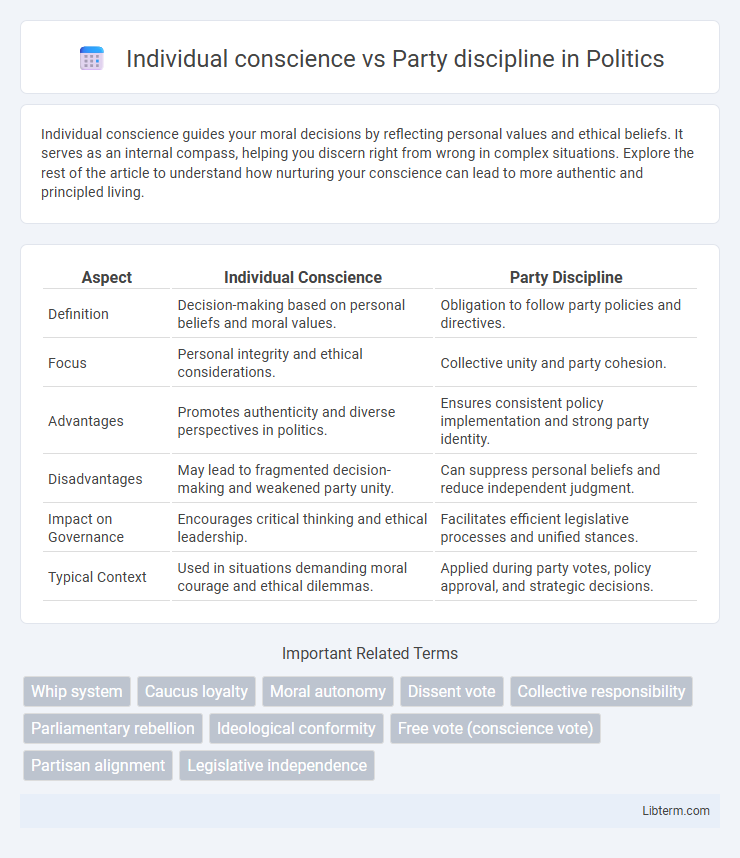Individual conscience guides your moral decisions by reflecting personal values and ethical beliefs. It serves as an internal compass, helping you discern right from wrong in complex situations. Explore the rest of the article to understand how nurturing your conscience can lead to more authentic and principled living.
Table of Comparison
| Aspect | Individual Conscience | Party Discipline |
|---|---|---|
| Definition | Decision-making based on personal beliefs and moral values. | Obligation to follow party policies and directives. |
| Focus | Personal integrity and ethical considerations. | Collective unity and party cohesion. |
| Advantages | Promotes authenticity and diverse perspectives in politics. | Ensures consistent policy implementation and strong party identity. |
| Disadvantages | May lead to fragmented decision-making and weakened party unity. | Can suppress personal beliefs and reduce independent judgment. |
| Impact on Governance | Encourages critical thinking and ethical leadership. | Facilitates efficient legislative processes and unified stances. |
| Typical Context | Used in situations demanding moral courage and ethical dilemmas. | Applied during party votes, policy approval, and strategic decisions. |
Understanding Individual Conscience in Politics
Individual conscience in politics represents a politician's personal moral compass and ethical judgment, often guiding decisions contrary to party lines. Understanding this dynamic highlights the tension between personal integrity and collective party discipline, revealing the complexity of democratic representation. Recognizing individual conscience fosters transparency and accountability, promoting a political environment where diverse viewpoints enhance policy-making.
Defining Party Discipline and Its Importance
Party discipline refers to the strict adherence by members to the policies, decisions, and directives established by a political party's leadership, ensuring unified action and coherence in legislative behavior. It is crucial for maintaining organizational control, achieving collective goals, and presenting a consistent platform to voters and stakeholders. Effective party discipline enhances political stability, enforces accountability among members, and minimizes dissent that could weaken party influence and effectiveness.
Historical Cases: When Conscience Clashed with Party Lines
Historical cases of individual conscience clashing with party discipline reveal significant political tensions, such as Winston Churchill's dissent against the Conservative Party's appeasement policy in the 1930s. U.S. Senator Margaret Chase Smith's 1950 "Declaration of Conscience" challenged the Republican Party's McCarthyism tactics, exemplifying moral courage over party loyalty. These instances underscore the complex balance between personal ethics and collective political strategy in democratic governance.
The Ethical Dilemmas Facing Elected Officials
Elected officials frequently confront ethical dilemmas when individual conscience clashes with party discipline, challenging their ability to balance personal moral convictions against collective political agendas. Loyalty to party directives often pressures representatives to vote in line with party policies, even when those policies conflict with their ethical beliefs or constituent interests. Navigating this tension requires officials to weigh the consequences of dissenting, including potential political marginalization or loss of party support, against the imperative to uphold personal integrity and public trust.
Impact on Legislative Decision-Making
Individual conscience often drives legislators to vote based on personal ethics and constituent interests, potentially diverging from party lines. Party discipline enforces cohesion, ensuring unified legislative strategies and predictable voting outcomes. The tension between these forces shapes legislative decision-making by balancing independent judgment with collective party goals.
Public Perception: Loyalty vs. Integrity
Individual conscience often drives politicians to make decisions based on personal ethics and moral values, which can enhance public perception of integrity and trustworthiness. Party discipline, however, emphasizes loyalty to the collective agenda and unity, ensuring consistent messaging and strategic coherence in governance. Public perception tends to oscillate between valuing loyalty as a sign of stability and prioritizing integrity as a marker of genuine leadership.
Case Studies: High-Profile Defections and Dissent
High-profile defections from political parties often highlight the tension between individual conscience and party discipline, as seen in cases like UK MP Crispin Blunt's criticism of Conservative policies or the U.S. Senator John McCain's dissent on key defense issues. These defections reveal how personal ethical beliefs or constituency interests can clash with party mandates, influencing legislative dynamics and public perceptions. Case studies demonstrate that such acts of dissent may either trigger party reforms or deepen factional divides, shaping political stability and policy outcomes.
Balancing Representation: Serving Constituents or the Party?
Balancing representation requires elected officials to navigate the tension between individual conscience and party discipline while serving constituents. Legislators who prioritize personal values may better address local needs, yet strict party adherence ensures cohesive policy-making and political stability. Effective governance emerges from integrating authentic constituent representation with strategic party alignment to maximize accountability and legislative success.
Long-Term Implications for Democratic Institutions
Balancing individual conscience and party discipline shapes democratic institutions by influencing legislative independence and accountability. Excessive party control can undermine representative responsiveness, leading to voter disengagement and weakened democratic legitimacy. Conversely, fostering individual conscience within parties promotes diverse debate and resilience in democratic governance over time.
Strategies for Reconciling Conscience and Party Loyalty
Balancing individual conscience with party discipline requires transparent communication channels that allow members to express dissent without undermining unity. Implementing flexible voting procedures, such as free votes on moral issues, helps accommodate personal ethics while maintaining collective cohesion. Leadership fostering a culture of respect for diverse viewpoints enhances trust and strengthens overall party integrity.
Individual conscience Infographic

 libterm.com
libterm.com